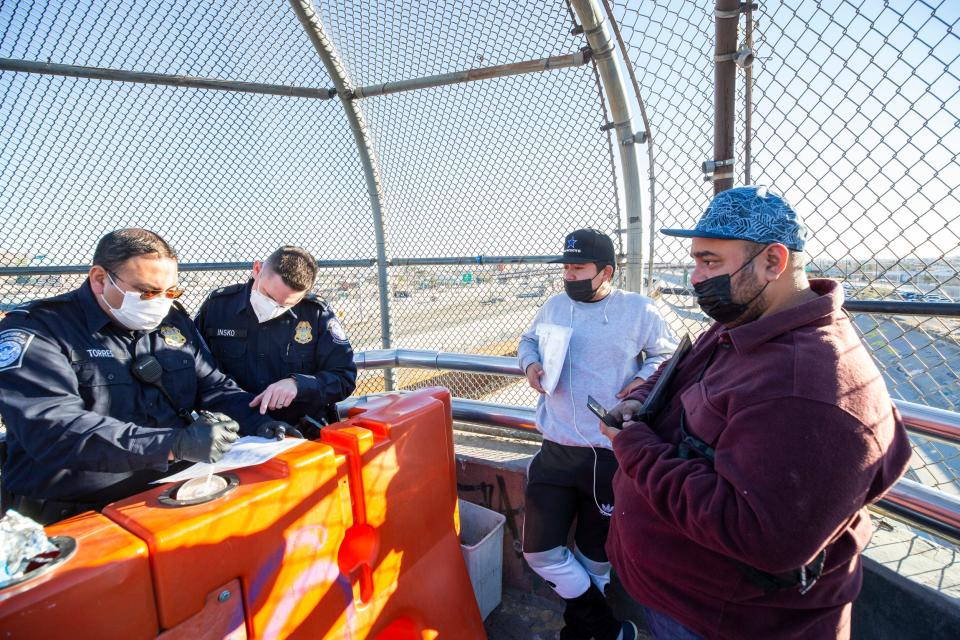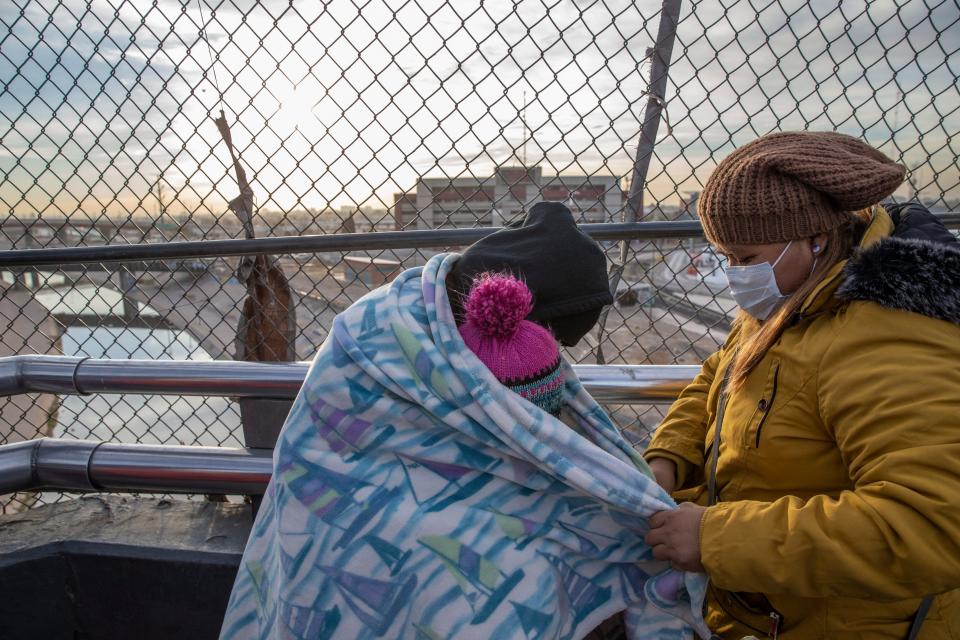Court hearings in controversial 'Remain in Mexico' asylum program resume in El Paso
Hearings in a controversial asylum program have begun again in El Paso, a first step for migrants forced to wait in Mexico to pursue a claim to stay in the U.S.
Last month, the Biden administration revived the Trump-era "Migrant Protection Protocols" after a federal judge ordered it reinstated, ruling that it had been improperly terminated. U.S. Customs and Border Protection began returning some asylum seekers to Juárez and other Mexican border cities to await immigration court hearings in the U.S.
More: Return of the 'Remain in Mexico' asylum program revives Trump-era border policy
Mauricio Sanchez, a 29-year-old Nicaraguan, was among those enrolled in the program, also known as "Remain in Mexico," in December and returned to Juárez.
After crossing the U.S. border in McAllen, Texas, Sanchez said he turned himself into Border Patrol, claiming he was fleeing political violence in Nicaragua. Border authorities flew him to El Paso, detained him for nearly two weeks then returned him to Juárez with documents explaining the Migrant Protection Protocols and assigning a court date for Jan. 6.
"I went to my first hearing and they gave me a new court date two months out," he said after attending a Thursday hearing. "I feel bad because, you know, being here in Mexico ... I come fleeing violence in my country and this country is equally violent.
"It's peligrosísima," he said, "so very dangerous for us migrants."

Asylum decisions in six months or less
Twice a day, the United Nations' International Organization for Migration transports migrants staying in Juárez shelters to the Paso del Norte bridge to attend their MPP court hearings. Others arrive to the bridge on their own, waiting before dawn if their appointment is in the morning.
After CBP processes them, U.S. Immigration and Customs Enforcement delivers them to the federal courthouse where Executive Office of Immigration Review judges hold their hearings. So far, migrants are only attending master hearings, in which a judge explains their rights and the MPP process.

Mexico agreed to accept the returns of MPP migrants again under certain conditions, including ensuring the asylum review process not take longer than six months. Mexico also required the U.S. refrain from returning vulnerable populations, including pregnant women and minors.
Advocates say in El Paso only single men are being placed in the program. CBP in El Paso confirmed that fewer than 30 people per day are being returned to Juárez.
When the Trump administration began MPP in 2019, more than 70,000 asylum seekers — including children traveling with their parents — were made to wait in Mexican border cities for court hearings in a process that took years in some cases. Thousands gave up their chance to seek protection in the U.S. after facing threats, violence or poverty in places like Juárez, Nogales, Tijuana or Matamoros.
Of the 45,444 MPP cases adjudicated so far, immigration judges granted asylum to 742 people for an asylum approval rate of 1.6%, according to a data analysis by the Transactional Records Access Clearinghouse at Syracuse University, or TRAC. Judges approved some other immigration relief in roughly 1,800 cases.
No 'rightful access' to asylum
Immigrant advocates say MPP remains unfair. Forced to wait in Mexico, the vast majority of asylum seekers enrolled in the program have no access to a U.S. attorney — often the deciding factor in a migrant's chance at winning asylum under complex U.S. asylum law.
"There is no way to do MPP that affords people rightful access to the asylum system," said Shaw Drake, staff attorney and policy counsel on border and immigrant rights for the ACLU of Texas in El Paso. "It’s just impossible to have adequate access to legal representation."
An EOIR spokesman said the immigration courts agency is in the process of contracting with additional legal service providers to serve MPP enrollees when they enter the U.S. EOIR has a "Helpdesk" program, the spokesman said, in which legal service providers offer group and individual information sessions and provide referrals to pro bono representation.
In practice, access to pro bono representation in El Paso is extremely limited, given the enormous demand.
Sanchez attended his first hearing without an attorney and was assigned a second court date, in March. Now, stuck in Juárez, he said he wasn't sure what to do next. Other members of his family — aunts, uncles, cousins, a grandmother — are in Oregon and have been granted or are seeking asylum.
"I can't go back to my country," he said by phone in Juárez. "But here, anything could happen to me."
Yael Schacher, Refugees International deputy director for the Americas and Europe, attended the first MPP court hearings in El Paso this month and said 90% of migrants appeared without legal counsel.

Border agents have discretion in who they may place in MPP, Schacher said. In El Paso, the majority of those enrolled have been single men hailing from Nicaragua, Cuba, Venezuela and Colombia, she said.
"There is a lot of arbitrariness," she said. "It has to do with the logistics of the different border programs in place right now, including how many people Mexico is willing to take back on any given day."
Pandemic policy takes precedence
MPP has taken a backseat to another policy that allows U.S. border agents to quickly return people to Mexico: Title 42.
The pandemic-era policy invoked by the Centers for Disease Control and Prevention in March 2020 prohibits U.S. authorities from holding of migrants in "congregant settings," such as border holding cells. Despite the ban, Sanchez said he was held in a cell with more than 200 men for two weeks, without access to a shower, before he was placed in MPP.
Under Title 42, Border Patrol often processes migrants in the field and delivers them within hours to an international bridge, returning them to Mexico.
The Biden administration hasn't lifted Title 42, despite calls from immigrant advocates to do so. El Paso Sector Border Patrol Chief Gloria Chavez has called Title 42 a necessary tool for agents to enforce the border safely in an ongoing global pandemic.
The policy has resulted in a spike in repeat encounters, encouraging some migrants to try again and again to cross the border undetected.
Border Patrol's El Paso Sector reported 193,918 encounters in fiscal 2021. Eighty-three percent of those encounters, or 161,516, resulted in a return to Mexico or home country under Title 42 authority.
In the first two months of fiscal 2022, October and November, Border Patrol reported 29,526 encounters in El Paso Sector. Of those, 22,158, or 75%, were processed under Title 42.
So far, the migrants returned to Juárez under MPP hail largely from countries with which the U.S. has a shaky relationship and isn't able to easily deport or repatriate migrants under Title 42.
Lauren Villagran can be reached at lvillagran@elpasotimes.com.
This article originally appeared on El Paso Times: Migrant Protection Protocols hearings restart in El Paso

